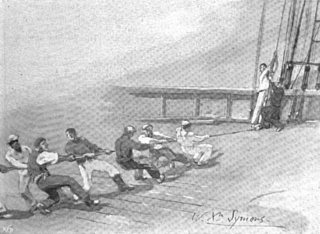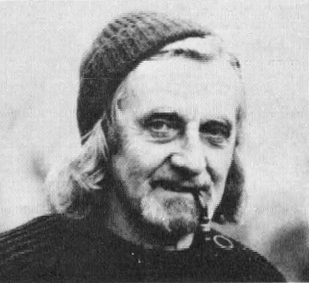
A sea shanty, shanty, chantey, or chanty is a genre of traditional folk song that was once commonly sung as a work song to accompany rhythmical labor aboard large merchant sailing vessels. The term shanty most accurately refers to a specific style of work song belonging to this historical repertoire. However, in recent, popular usage, the scope of its definition is sometimes expanded to admit a wider range of repertoire and characteristics, or to refer to a "maritime work song" in general.
"The First Nowell", modernised as "The First Noel", is a traditional English Christmas carol with Cornish origins most likely from the early modern period, although possibly earlier. It is listed as number 682 in the Roud Folk Song Index.
"Drunken Sailor", also known as "What Shall We Do with a/the Drunken Sailor?" or "Up She Rises", is a traditional sea shanty, listed as No. 322 in the Roud Folk Song Index. It was sung aboard sailing ships at least as early as the 1830s.

The Golden Age of Piracy is a common designation for the period between the 1650s and the 1730s, when maritime piracy was a significant factor in the histories of the North Atlantic and Indian Oceans.

Stanley James Hugill was a British folk music performer, artist and sea music historian, known as the "Last Working Shantyman" and described as the "20th century guardian of the tradition".
"Oh Shenandoah" is a traditional folk song, sung in the Americas, of uncertain origin, dating to the early 19th century.
"Bonny Portmore" is an Irish traditional folk song which laments the demise of Ireland's old oak forests, specifically the Great Oak of Portmore or the Portmore Ornament Tree, which fell in a windstorm in 1760 and was subsequently used for shipbuilding and other purposes.
"(The) Leaving of Liverpool", also known as "Fare Thee Well, My Own True Love", is a folk song. Folklorists classify it as a lyrical lament and it was also used as a sea shanty, especially at the capstan. It is very well known in Britain, Ireland, and America, despite the fact that it was collected only twice, from the Americans Richard Maitland and Captain Patrick Tayluer. It was collected from both singers by William Main Doerflinger, an American folk song collector particularly associated with sea songs in New York. The song's narrator laments his long sailing trip to California and the thought of leaving his loved ones, pledging to return to her one day.
"The Sweet Trinity", also known as "The Golden Vanity" or "The Golden Willow Tree", is an English folk song or sea shanty. The first surviving version, about 1635, was "Sir Walter Raleigh Sailing In The Lowlands ".

The "Boar's Head Carol" is a macaronic 15th century English Christmas carol that describes serving a boar's head at a Yuletide feast. Of the several extant versions of the carol, the one most usually performed today is based on a version published in 1521 in Wynkyn de Worde's Christmasse Carolles. A modern choral arrangement by Elizabeth Poston (1960) is also widely performed.

"Spanish Ladies" is a traditional British naval song, typically describing a voyage from Spain to the Downs from the viewpoint of ratings of the Royal Navy. Other prominent variants include an American variant called "Yankee Whalermen", an Australian variant called "Brisbane Ladies", and a Newfoundland variant called "The Ryans and the Pittmans".
Anthony Grant Barrand was a British-born American folk singer and academic. He was a Professor of Anthropology, College of Arts and Sciences, Boston University, where his courses included "Stalking the Wild Mind: The Psychology and Folklore of Extra-Sensory Perception and Psychic Phenomena", "English Ritual Dance and Drama", and "Folk Songs as Social History".
Roberts and Barrand was a musical group formed in 1969 by John Roberts and Tony Barrand while they were graduate students in psychology at Cornell University. Much of their repertoire is traditional English music, although they have also recorded albums of traditional sea shanties.
Nowell Sing We Clear is a previously four-member musical group that performs an annual yuletide concert series. They have also released a series of related albums and a songbook of their repertoire.
"Hanging on the Old Barbed Wire" is a British war song of World War I. The song sarcastically recounts the location of various army members, not to be found in the combat zone, and concludes by describing the location of the old battalion: "hanging on the old barbed wire". A barbed wire fence separated the front-line trench from no man's land, and men brave or unfortunate enough to go over the top of the dug-out were often quickly shot and their bodies caught in the barbed wire. This troop song was not popular with officers, who thought it bad for morale, though attempts to suppress it were unsuccessful.
Tom and Chris Kastle are a maritime music performing duo based in Chicago. They first began performing maritime music in approximately 1977. In the mid-1980s they were known for running "whale watching" concert cruises on Lake Michigan on the sailing schooner Charlotte Ann.

The Mystic Seaport Sea Music Festival, held annually in June from 1980 to 2019 at the Mystic Seaport Museum in Mystic, Connecticut, was among the oldest, and was the largest sea music festival in the United States. It reportedly attracted "the highest caliber of sea music performers, scholars, and fans." The Festival was first organized by Dr. Stuart M. Frank as a place to perform and hear sea music as well as a symposium for ethnomusicologists, anthropologists, and historians.

"Masters in This Hall" is a Christmas carol with words written around 1860 by the English poet and artist William Morris to an old French dance tune. The carol is moderately popular around the world but has not entered the canon of most popular carols.

The Chicago Maritime Festival is a maritime music and culture festival held in Chicago, Illinois, every winter, usually the last weekend in February, usually at the Chicago History Museum. It is not uncommon for over 500 people to participate. It has existed in its present incarnation since 2003 and is the only wintertime festival featuring maritime music in the United States. The main organizers are performers Tom & Chris Kastle.
Louisa "Lou" Jo Killen was an English folk singer from Gateshead, Tyneside, who also played the English concertina.








